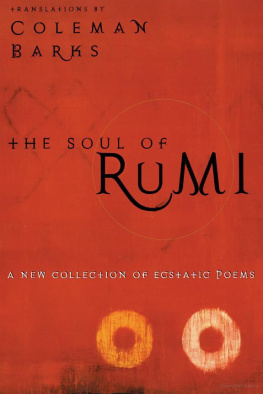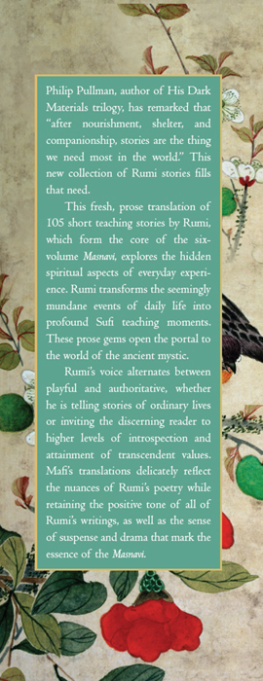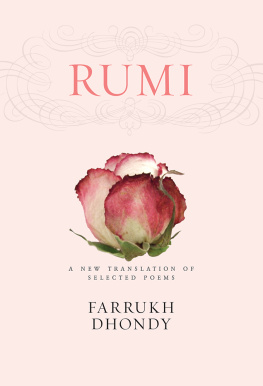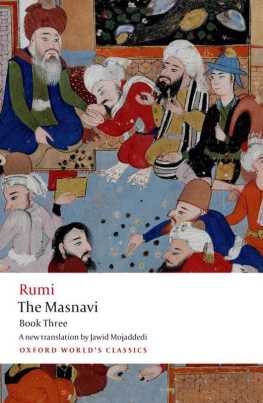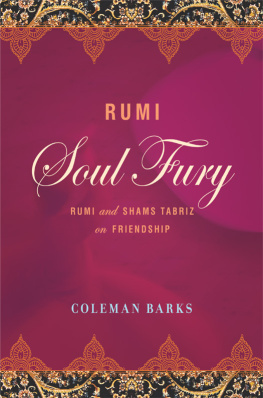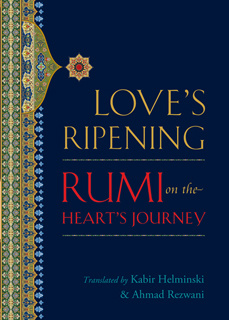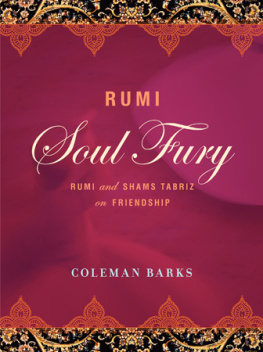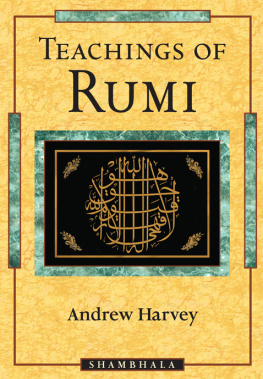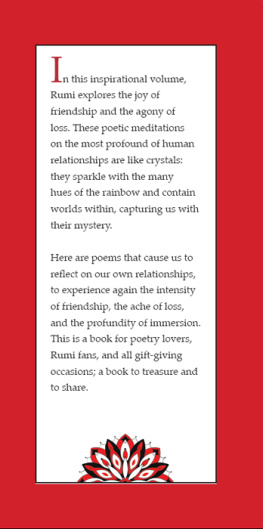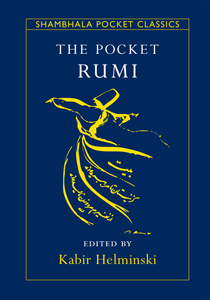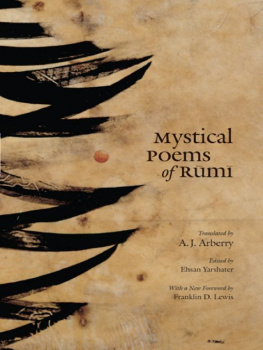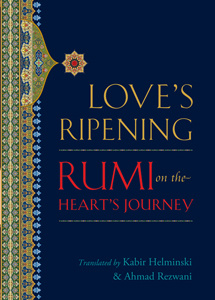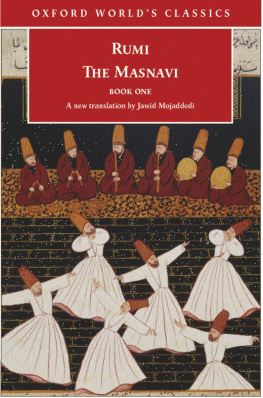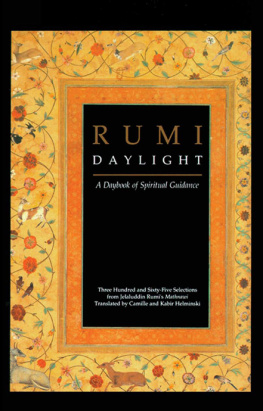Rumi - The Soul of Rumi
Here you can read online Rumi - The Soul of Rumi full text of the book (entire story) in english for free. Download pdf and epub, get meaning, cover and reviews about this ebook. year: 2001, publisher: HarperCollins, genre: Art. Description of the work, (preface) as well as reviews are available. Best literature library LitArk.com created for fans of good reading and offers a wide selection of genres:
Romance novel
Science fiction
Adventure
Detective
Science
History
Home and family
Prose
Art
Politics
Computer
Non-fiction
Religion
Business
Children
Humor
Choose a favorite category and find really read worthwhile books. Enjoy immersion in the world of imagination, feel the emotions of the characters or learn something new for yourself, make an fascinating discovery.
- Book:The Soul of Rumi
- Author:
- Publisher:HarperCollins
- Genre:
- Year:2001
- Rating:4 / 5
- Favourites:Add to favourites
- Your mark:
- 80
- 1
- 2
- 3
- 4
- 5
The Soul of Rumi: summary, description and annotation
We offer to read an annotation, description, summary or preface (depends on what the author of the book "The Soul of Rumi" wrote himself). If you haven't found the necessary information about the book — write in the comments, we will try to find it.
Rumi: author's other books
Who wrote The Soul of Rumi? Find out the surname, the name of the author of the book and a list of all author's works by series.
The Soul of Rumi — read online for free the complete book (whole text) full work
Below is the text of the book, divided by pages. System saving the place of the last page read, allows you to conveniently read the book "The Soul of Rumi" online for free, without having to search again every time where you left off. Put a bookmark, and you can go to the page where you finished reading at any time.
Font size:
Interval:
Bookmark:

A NEW COLLECTION OF ECSTATIC POEMS
Translations, Introductions,
and Notes by
COLEMAN BARKS
with John Moyne, Nevit Ergin, A. J. Arberry,
Reynold Nicholson, and M. G. Gupta

for friendship and friends, such blessing
John Ryan Seawright
19562001
My academic training, at Berkeley and Chapel Hill, was in modern literature. I wrote a dissertation on Conrad and taught twentieth-century American poetry courses and creative writing at the University of Georgia in Athens for years. I had never even heard Rumis name until 1976, when Robert Bly handed me a copy of A. J. Arberrys translations, saying, These poems need to be released from their cages.
How any translator chooses to work on one poet, and not on others, is a mysterious thing. Some attunement must be there. I felt drawn immediately to the spaciousness and longing in Rumis poetry. I began to explore this new world, rephrasing Arberrys English. I sent some early attempts to a friend, Milner Ball, who was teaching law at Rutgers-Camden. He, inexplicably, read them to his torts class. A young law student, Jonathan Granoff, came up afterward, asked him for my address, and started writing, urging me to come meet his teacher in Philadelphia.
In September of 1978 when I finally did walk into the room where the Sri Lankan saint Bawa Muhaiyaddeen sat on his bed talking to a small group, I realized that I had met this man in a dream the year before. Heres the dream from May 2, 1977, my holy day: I am sleeping out on the bluff above the Tennessee River where I grew up. I wake inside the dream, still asleep, but awake in the sleeping bag Im in. A ball of light rises from Williams Island and comes over me. I think its a UFO; then it clarifies from the center out, revealing a man sitting cross-legged with head bowed and eyes closed, a white shawl over the back of his head. He raises his head and opens his eyes. I love you, he says. I love you too, I answer. The landscape, that beautiful curve of river, feels suddenly drenched with dew, and I know that the wetness is love. I felt the process of the dew forming and I knew, somehow, what the essence of it was.
When I visited him in Philadelphia, Bawa told me to continue the Rumi work. It has to be done. But, he cautioned, If you work on the words of a gnani, you must become a gnani, a master. I did not become one of those, but for nine years, for four or five intervals during each year, I was in the presence of one.
Rumi says,
Mind does its fine-tuning hair-splitting,
but no craft or art begins
or can continue without a master
giving wisdom into it.
I would have little notion what Rumis poetry is or where it comes from if I were not connected to this Sufi teacher. Though its not necessary to use the word Sufi. The work Bawa did and does with me is beyond religion. Love is the religion, and the universe is the book. Working on Rumis poetry deepens the inner companionship. My apprenticeship continues, and whatever else they are, these versions or translations or renderings or imitations are homage to a teacher. And yet not as a follower, more as a friend. In some way I am very grateful for, these poems feel as if they come as part of a continuing conversation. I once asked Bawa if what I saw in his eyes could someday come up behind my eyes and look out. He began to talk about the subtle relationship between a teacher and the community. Not until the I becomes a we.
There was a childhood joke I did not get until recently. At age six I was a geography freak. I memorized all the capitals of all the countries in the 1943 Rand McNally Atlas, which I still have. I grew up on the campus of a boys school in Chattanooga, Baylor. My father was headmaster, and the teachers there were always testing this odd expertise of mine. Bulgaria, someone would call out across the quadrangle. Sophia, Id answer. I could not be stumped, until the ecstatic trickster James Pennington went down in his basement Latin classroom and came up with a country that had no capital, on his map at least. Cappadocia, he called. The look on my face, he laughed, what I didnt know, named me. From then on I was called Cappadocia, or Capp. To be more precise, Pennington called me that, but he did it loudly and often.
I almost fell down a few years ago when I remembered the nickname and realized that the central city of that Anatolian area was Iconium, now Konya, where Rumi lived and is buried. Rumi means the one from Rum, the part of Anatolia under Roman influence. I dont mean to claim a special relationship with Rumi. Mevlanas poetry has been a large part of my life for twenty-five years. It has brought many friends and wonderful opportunities. The synchronicities that introduced me to Rumi continue to delight and exfoliate in wonderful ways. This work involves an emptying out, a surrender (despite the strut of personal incidents here). Thats how the collaboration feels. Its also a form of healing, a way to play and praise, to feel grief and gratitude, and an unfolding friendship with a teacher. Or say these poems are love poems, the intimate conversation of self with deep self, Cappadocia with Bawa, me with you. Rumis poetry is Gods funny family talking on a big open radio line.
Forty Sections of Poetry
with Commentaries
and Book IV of theMasnavi
The thirteenth century in the Near East was a time of tremendous political turmoil and war: the Christian military expeditions called crusades continued to set out from the European west across the Anatolian peninsula, and from the east the inexorable Mongol armies rode down from the Asian steppes.
It was also a time of brilliant mystical awareness, when the lives of three of the worlds great lovers of Gods presence in humanity, and in existence itself, overlapped: Francis of Assisi (c. 11821226) at the beginning of the century, Meister Eckhart (c. 12601328) at the end, and Jelaluddin Rumi (120773) at the center. They were all magnificently surrendered souls, and wonderful creators with language.
Rumi was born near the city of Balkh, in what is now Afghanistan, then the eastern edge of the Persian empire, on September 30, 1207. He was the descendant of a long line of Islamic jurists, theologians, and mystics. His father, Bahauddin Walad, wrote an intimate spiritual diary, the Maarif (Love Notes of Self to Soul), which Rumi treasured.
When Rumi was still a young man, his family fled from Balkh, just ahead of the invading armies of Genghis Khan, who was extending his Mongol empire through Persia and would eventually reach all the way to the Adriatic Sea. Rumi and his family traveled to Damascus and on to Nishapur, where they met the poet and teacher Fariduddin Attar, who recognized the teenaged boy Rumi as a great spirit. He is reported to have said, as he saw Bahauddin walking toward him with the young Rumi a little behind, Here comes a sea, followed by an ocean! To honor this insight, Attar gave Rumi his book, the Ilabinama (The Book of God).
Rumis family eventually settled in Konya, in south-central Turkey, where Bahauddin resumed his role as the head of the dervish learning community, or medrese. Several years later, when Rumi was still in his twenties, his father died, and Rumi assumed the position, directing the study of theology, poetry, music, and other subjects and practices related to the growth of the soul, including cooking and the husbandry of animals. Rumi gained a wide reputation as a devout scholar, and his school numbered over ten thousand students.
Font size:
Interval:
Bookmark:
Similar books «The Soul of Rumi»
Look at similar books to The Soul of Rumi. We have selected literature similar in name and meaning in the hope of providing readers with more options to find new, interesting, not yet read works.
Discussion, reviews of the book The Soul of Rumi and just readers' own opinions. Leave your comments, write what you think about the work, its meaning or the main characters. Specify what exactly you liked and what you didn't like, and why you think so.

